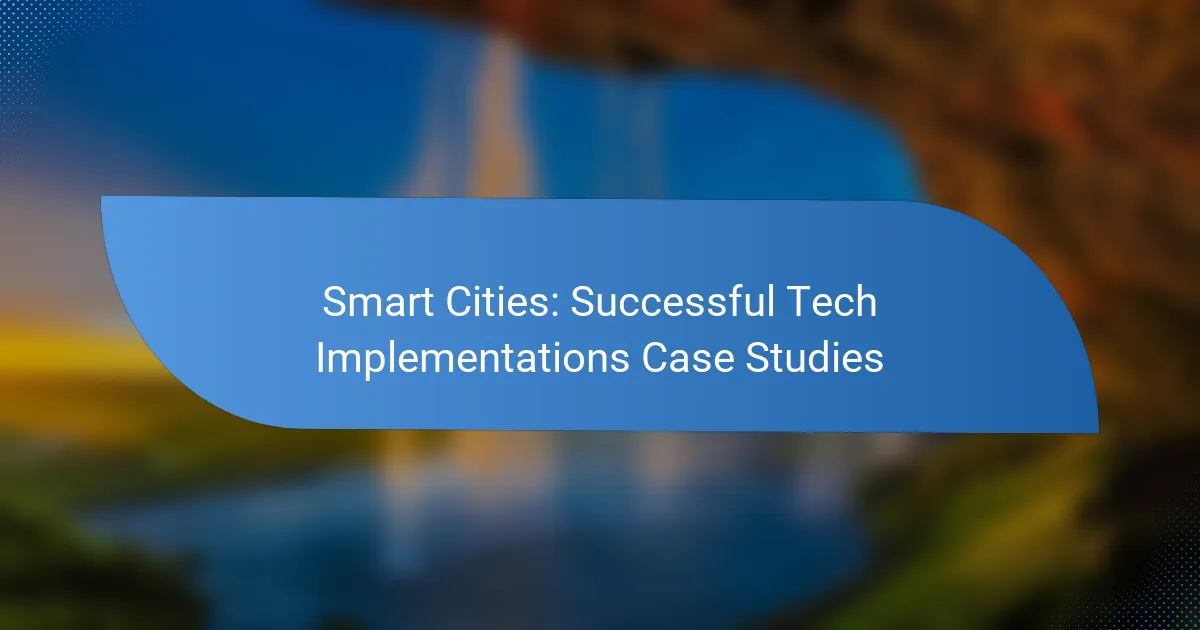Smart cities represent a transformative approach to urban living, utilizing advanced technologies to enhance efficiency, sustainability, and quality of life. By integrating solutions such as the Internet of Things (IoT), Big Data Analytics, and Artificial Intelligence (AI), these cities address pressing urban challenges and improve public services. This exploration of successful case studies highlights the innovative implementations that are reshaping urban environments for the better.
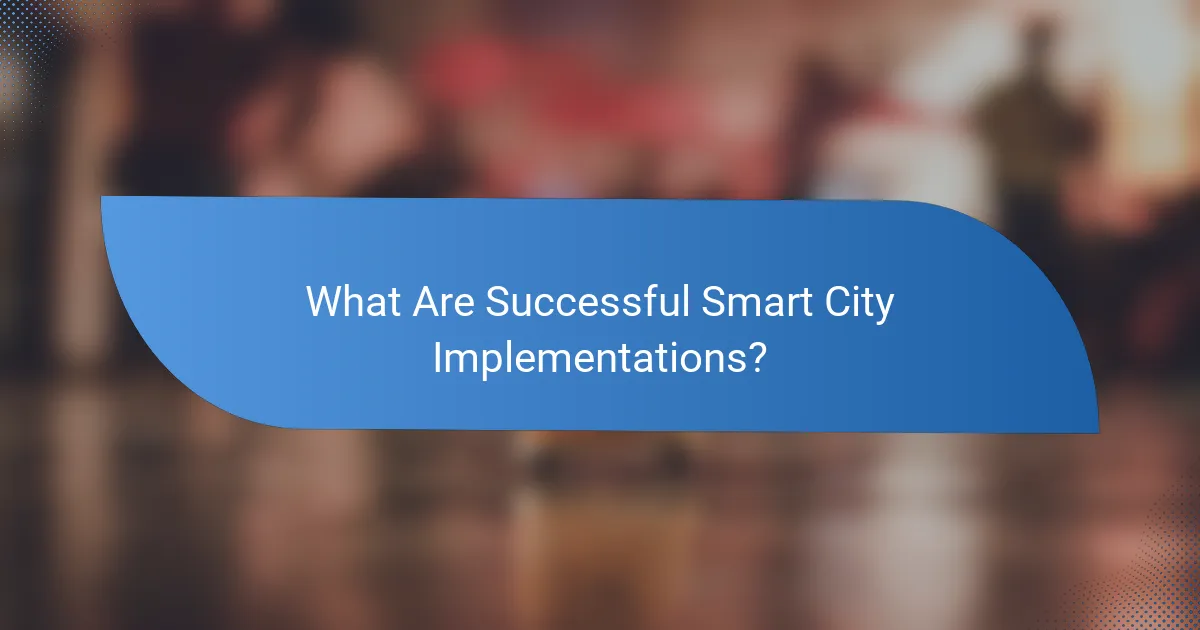
What Are Successful Smart City Implementations?
Successful smart city implementations leverage technology to enhance urban living, improve efficiency, and foster sustainability. These projects often focus on infrastructure, mobility, and public services, utilizing data and connectivity to address urban challenges.
Barcelona Smart Lighting System
Barcelona’s smart lighting system is designed to optimize energy use and improve public safety. By integrating LED technology with sensors, the city can adjust lighting levels based on real-time data, such as pedestrian traffic and environmental conditions.
This system has led to significant energy savings, reportedly reducing electricity consumption by around 30-40%. Additionally, the smart lighting can be controlled remotely, allowing for quick responses to maintenance needs or emergencies.
Singapore Smart Traffic Management
Singapore’s smart traffic management system utilizes a combination of sensors, cameras, and data analytics to monitor and manage traffic flow. This system allows for real-time adjustments to traffic signals, helping to alleviate congestion and improve travel times.
Key features include a dynamic pricing model for road usage, which encourages off-peak travel, and an integrated public transport system that provides commuters with timely information. This approach has reportedly reduced average travel times by approximately 10-15% during peak hours.
Amsterdam Smart Waste Management
Amsterdam’s smart waste management system employs sensors in waste bins to monitor fill levels. This data helps optimize collection routes and schedules, reducing unnecessary pickups and lowering operational costs.
The city has seen a reduction in waste collection costs by about 20% since implementing this system. Additionally, the initiative promotes recycling by providing real-time feedback to residents on their waste disposal habits, fostering a culture of sustainability.
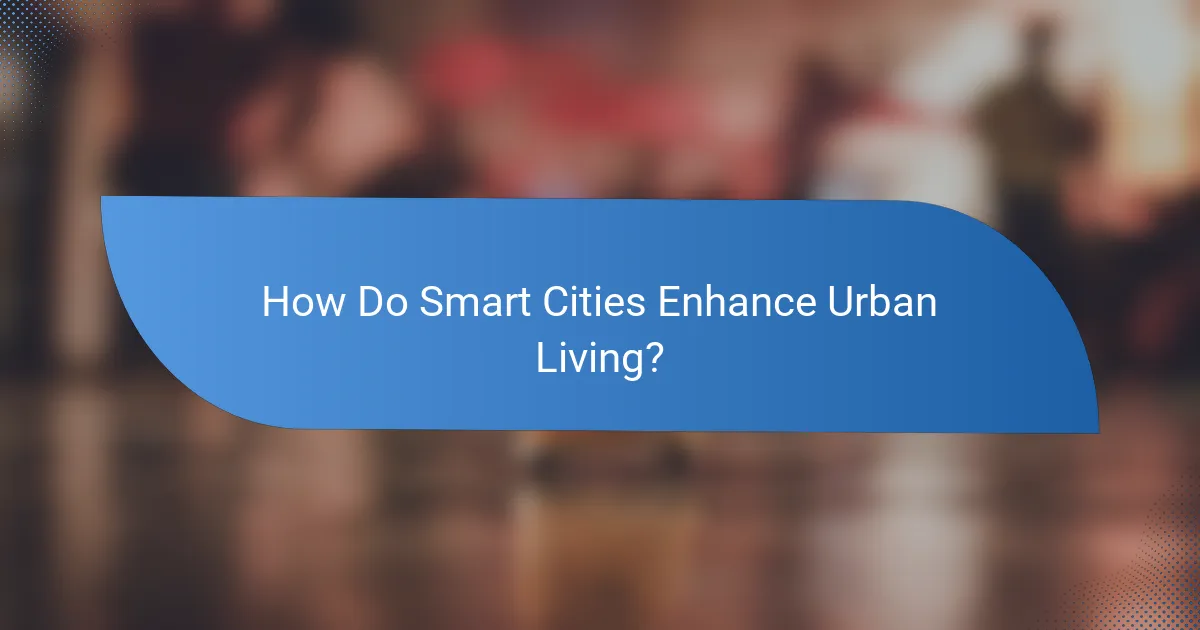
How Do Smart Cities Enhance Urban Living?
Smart cities enhance urban living by integrating technology into city infrastructure to improve quality of life, sustainability, and efficiency. These advancements lead to better public services, reduced environmental impact, and improved citizen engagement.
Improved Public Safety
Smart cities utilize technology to enhance public safety through surveillance systems, emergency response coordination, and data analytics. For example, cities can deploy smart cameras that use AI to detect unusual behavior, allowing for quicker police response times.
Additionally, smart streetlights equipped with sensors can detect emergencies and alert authorities immediately. This proactive approach can significantly reduce crime rates and improve overall community safety.
Efficient Resource Management
Efficient resource management in smart cities involves the use of IoT devices to monitor and optimize the use of water, energy, and waste. For instance, smart water meters can detect leaks in real-time, saving both water and money for municipalities.
Moreover, energy-efficient buildings equipped with smart grids can adjust energy consumption based on demand, leading to lower utility costs and reduced environmental impact. Implementing these technologies can result in savings of up to 20% in resource usage.
Enhanced Mobility Solutions
Enhanced mobility solutions in smart cities focus on improving transportation systems through real-time data and smart infrastructure. Technologies such as traffic management systems use sensors to monitor traffic flow and adjust signals accordingly, reducing congestion and travel times.
Public transportation can also benefit from smart solutions, such as mobile apps that provide real-time updates on bus and train schedules. This encourages more people to use public transit, leading to decreased traffic and pollution in urban areas.
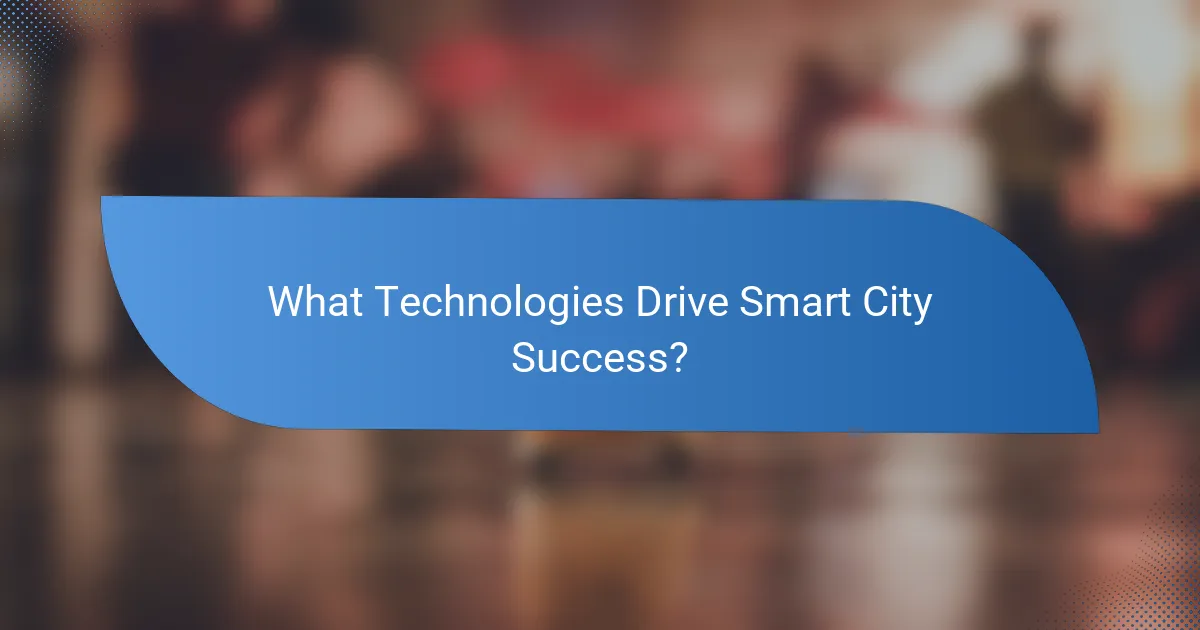
What Technologies Drive Smart City Success?
Smart city success relies on several key technologies that enhance urban living through improved efficiency and connectivity. The most impactful among these are the Internet of Things (IoT), Big Data Analytics, and Artificial Intelligence (AI), each playing a crucial role in transforming city infrastructure and services.
Internet of Things (IoT)
The Internet of Things (IoT) involves interconnected devices that collect and exchange data to optimize city functions. Sensors placed throughout urban areas can monitor traffic, air quality, and energy usage, providing real-time insights that inform decision-making.
For instance, smart traffic lights can adjust their timing based on current traffic conditions, reducing congestion and improving travel times. Cities can also use IoT for smart waste management, where bins signal when they need to be emptied, leading to more efficient waste collection routes.
Big Data Analytics
Big Data Analytics enables cities to process vast amounts of information gathered from various sources, including IoT devices, social media, and public records. By analyzing this data, city planners can identify trends, forecast needs, and allocate resources more effectively.
For example, analyzing transportation data can help cities optimize public transit schedules and routes, improving service for residents. Additionally, predictive analytics can assist in emergency response planning by identifying areas most at risk during natural disasters.
Artificial Intelligence (AI)
Artificial Intelligence (AI) enhances smart city initiatives by enabling machines to learn from data and make autonomous decisions. AI algorithms can analyze patterns in city data to improve services such as public safety, energy management, and traffic control.
One practical application is the use of AI in surveillance systems to detect unusual activities and alert law enforcement. AI can also optimize energy consumption in buildings by learning usage patterns and adjusting heating or cooling accordingly, which can lead to significant cost savings for municipalities.
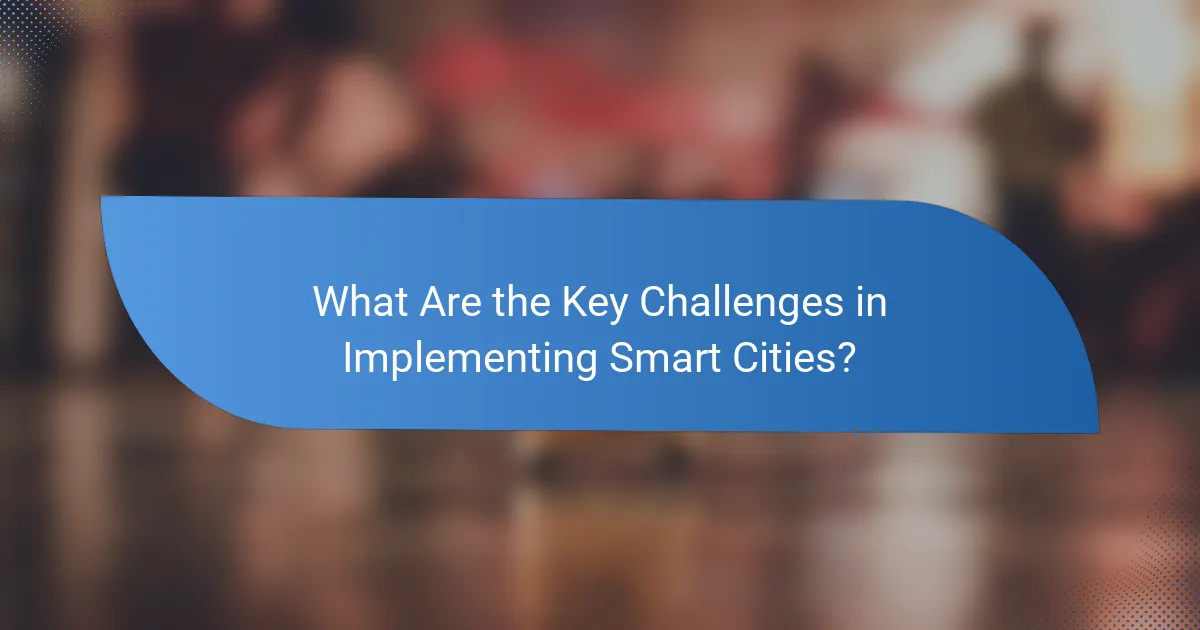
What Are the Key Challenges in Implementing Smart Cities?
Implementing smart cities involves several key challenges that can hinder progress. These challenges include data privacy concerns, high infrastructure costs, and interoperability issues among various technologies and systems.
Data Privacy Concerns
Data privacy is a significant challenge in smart city implementations, as these projects often rely on collecting vast amounts of personal information from citizens. Ensuring that this data is protected against breaches and misuse is crucial to maintaining public trust.
Governments and organizations must comply with regulations such as the General Data Protection Regulation (GDPR) in Europe, which mandates strict guidelines on data handling. Failure to adhere to these regulations can lead to severe penalties and loss of credibility.
Infrastructure Costs
The costs associated with developing the necessary infrastructure for smart cities can be substantial. Investments in advanced technologies, such as IoT devices, high-speed internet, and data centers, can run into millions of dollars.
City planners should consider phased implementations and prioritize projects based on available funding and potential impact. Public-private partnerships can also help share the financial burden and accelerate development.
Interoperability Issues
Interoperability is a critical issue in smart city projects, as various systems and technologies must work together seamlessly. Lack of standardization can lead to compatibility problems, making it difficult to integrate new solutions with existing infrastructure.
To address interoperability, stakeholders should adopt open standards and protocols that facilitate communication between different systems. Regular testing and updates can also help ensure that all components function effectively together.
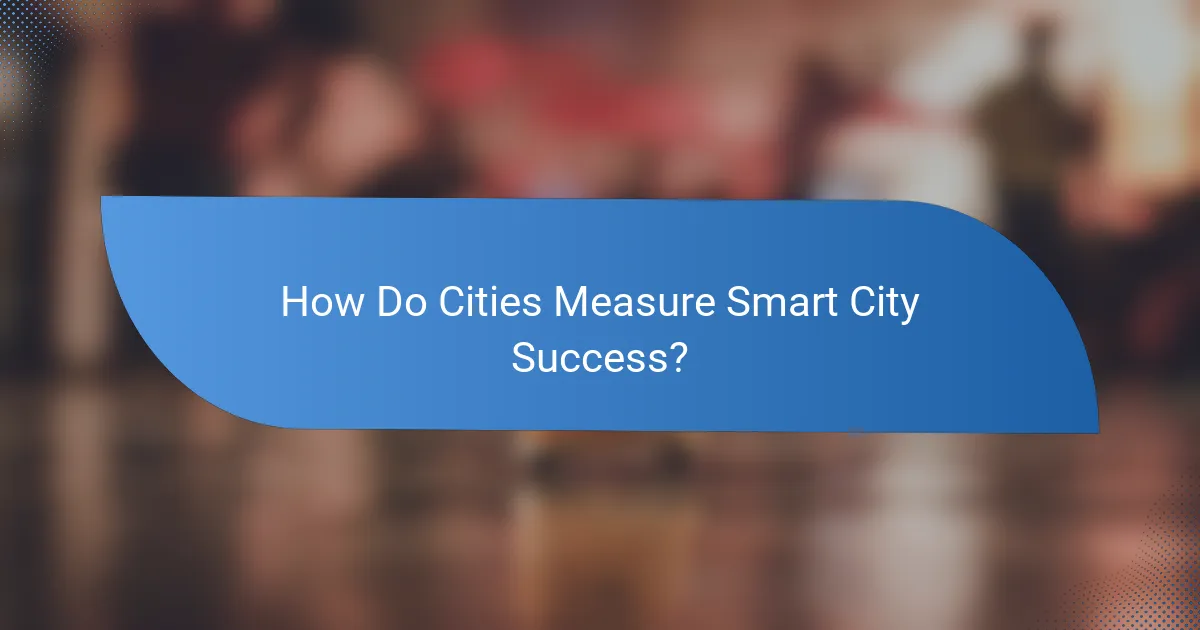
How Do Cities Measure Smart City Success?
Cities measure smart city success through various indicators that reflect the effectiveness of technology implementations. Key metrics include citizen satisfaction, environmental impact, and economic growth, providing a comprehensive view of how smart initiatives enhance urban living.
Citizen Satisfaction Surveys
Citizen satisfaction surveys are essential for gauging public perception of smart city initiatives. These surveys typically ask residents about their experiences with services such as public transportation, waste management, and digital connectivity.
To ensure effective feedback, cities should employ a mix of quantitative ratings and qualitative comments. Aiming for a response rate of at least 20-30% can provide a representative sample of the population’s views.
Environmental Impact Assessments
Environmental impact assessments evaluate how smart city technologies affect local ecosystems and sustainability goals. These assessments often measure factors like air quality, energy consumption, and waste reduction.
For instance, cities might track reductions in carbon emissions or improvements in energy efficiency after implementing smart grids or intelligent traffic systems. Regular assessments can help adjust strategies to meet environmental targets effectively.
Economic Growth Metrics
Economic growth metrics are crucial for understanding the financial benefits of smart city projects. Key indicators include job creation, business growth, and increases in local tax revenues.
Cities can analyze data from local businesses to assess the impact of smart initiatives on economic activity. For example, a rise in new startups or an increase in foot traffic in commercial areas can indicate successful tech implementations.
